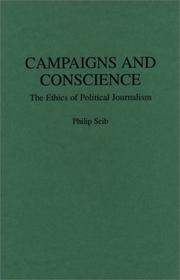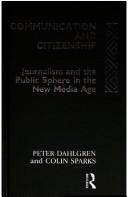| Listing 1 - 10 of 60 | << page >> |
Sort by
|
Book
ISBN: 9780226681702 Year: 2022 Publisher: Chicago : University of Chicago Press,
Abstract | Keywords | Export | Availability | Bookmark
 Loading...
Loading...Choose an application
- Reference Manager
- EndNote
- RefWorks (Direct export to RefWorks)
In The Paradox of Democracy: New Media and the Eternal Problem of Politics, Sean Illing and Zac Gershberg argue that, although free speech and media has always been a necessary condition of democracy, that very freedom also is its greatest threat. Free speech gives those who would destroy democracy license to mislead the public, using whatever forms of media are available. New forms of media offer opportunities to both supporters and critics of democracy. Reaching back to the ancient Greeks and continuing through media disruptions such as the invention of the printing press, the growth of "yellow" journalism and mass circulation newspapers, to new media today, they contend that democracies have always been unsettled by changes in media. The authors trace how each of these changes have challenged democracy by providing new ways of talking about politics and of reaching audiences with often unsettling effects. They conclude by exploring what kinds of communication facilitates and defends democracy as changing technology overwhelms older forms of communication.
Book
ISBN: 9781907384011 1907384014 Year: 2010 Publisher: Oxford Reuters Institute for the Study of Journalism
Abstract | Keywords | Export | Availability | Bookmark
 Loading...
Loading...Choose an application
- Reference Manager
- EndNote
- RefWorks (Direct export to RefWorks)
Journalism --- Democracy --- Economic aspects --- Political aspects --- Business --- Democracy. --- Models. --- Economic aspects. --- Political aspects. --- Journalism - Economic aspects --- Journalism - Political aspects
Book
ISSN: 24977535 ISBN: 9782252040904 2252040904 Year: 2017 Volume: 8 Publisher: Paris : Klincksieck,
Abstract | Keywords | Export | Availability | Bookmark
 Loading...
Loading...Choose an application
- Reference Manager
- EndNote
- RefWorks (Direct export to RefWorks)
L'auteure montre que la position du journaliste en démocratie est déterminante car elle permet de réaliser le rassemblement de la communauté politique et d'y faire vivre du conflit. A la croisée de la démocratie et du journalisme, coexistent donc deux scènes : la scène des représentations qui offre une issue symbolique aux conflits qui agitent l'autre, celle des actions. ©Electre 2017 A quoi sert le journalisme en démocratie ? Que veut dire voir et faire voir le monde au présent ? Quel est le sens politique d'une telle activité ? Existe-t-il un journalisme "idéal", à l'aune duquel juger le journalisme "réel" ? Sur quelle base le critiquer, et pour lui indiquer quels chemins aujourd'hui ? Dans cet essai stimulant, le premier à soumettre le journalisme à un questionnement philosophique, Géraldine Muhlmann montre qu'une double tâche est assignée au journalisme : faire vivre du conflit et tisser du commun au sein de la communauté politique. C'est finalement l'énigme de la démocratie qu'elle explore : la coexistence de deux scènes, celle des actions et celle des représentants, la seconde offrant une issue symbolique aux conflits qui agitent la première.
Journalisme -- Aspect politique --- Journalisme --- Démocratie --- Aspect politique --- Philosophie --- Journalism --- Press and politics --- Democracy --- Political aspects --- Democracy. --- Philosophy --- Journalism - Political aspects
Book
ISBN: 9814414174 9814414166 Year: 2012 Publisher: Singapore : ISEAS Publishing,
Abstract | Keywords | Export | Availability | Bookmark
 Loading...
Loading...Choose an application
- Reference Manager
- EndNote
- RefWorks (Direct export to RefWorks)
With the world watching closely, Myanmar began a process of political, administrative and institutional transition from 30 January 2011. After convening the parliament, elected in November 2010, the former military regime transferred power to a new government headed by former Prime Minister (and retired general), U Thein Sein. With parliamentary processes restored in Myanmar's new capital of Naypyitaw, Thein Sein's government announced a wide-ranging reform agenda, and began releasing political prisoners and easing press censorship. Pivotal meetings between Thein Sein and Aung San Suu Kyi led to amendment of the Election Law and the National League for Democracy contesting by-elections in April 2012. The 2011 Myanmar/Burma update conference considered the openings offered by these political changes and media reforms and the potential opportunities for international assistance. Obstacles covered include impediments to the rule of law, the continuation of human rights abuses, the impunity of the Army, and the failure to end ethnic insurgency.
Book
ISBN: 3446116451 9783446116450 Year: 1972 Volume: 102 Publisher: München
Abstract | Keywords | Export | Availability | Bookmark
 Loading...
Loading...Choose an application
- Reference Manager
- EndNote
- RefWorks (Direct export to RefWorks)

ISBN: 027594624X 9780275946241 Year: 1994 Publisher: Westport, Conn. Praeger
Abstract | Keywords | Export | Availability | Bookmark
 Loading...
Loading...Choose an application
- Reference Manager
- EndNote
- RefWorks (Direct export to RefWorks)
Book
ISBN: 2870033044 9782870033043 Year: 1995 Publisher: Bruxelles : Editions Vie Ouvrière (E.V.O.),
Abstract | Keywords | Export | Availability | Bookmark
 Loading...
Loading...Choose an application
- Reference Manager
- EndNote
- RefWorks (Direct export to RefWorks)
Journalism --- Political aspects --- -Journalism --- -Writing (Authorship) --- Literature --- Publicity --- political aspects. --- -Political aspects --- Writing (Authorship) --- Fake news --- Press and politics --- political aspects --- Journalism - Political aspects --- Journalism - Belgium
Book
ISBN: 9780190067083 9780190067076 019006708X 0190067071 Year: 2020 Publisher: New York : Oxford University Press,
Abstract | Keywords | Export | Availability | Bookmark
 Loading...
Loading...Choose an application
- Reference Manager
- EndNote
- RefWorks (Direct export to RefWorks)
How do journalists know what they know? Who gets to decide what good journalism is and when it's done right? What sort of expertise do journalists have, and what role should and do they play in society? Until a couple of decades ago, journalists rarely asked these questions, largely because the answers were generally undisputed. Now, the stakes are rising for journalists as they face real-time critique and audience pushback for their ethics, news reporting, and relevance. Yet the crises facing journalism have been narrowly defined as the result of disruption by new technologies and economic decline. This book argues that the concerns are in fact much more profound.Drawing on their five years of research with journalists in the U.S. and Canada, in a variety of news organizations from startups and freelancers to mainstream media, the authors find a digital reckoning taking place regarding journalism's founding ideals and methods. The book explores journalism's long-standing representational harms, arguing that despite thoughtful explorations of the role of publics in journalism, the profession hasn't adequately addressed matters of gender, race, intersectionality, and settler colonialism. In doing so, the authors rethink the basis for what journalism says it could and should do, suggesting that a turn to strong objectivity and systems journalism provides a path forward. They offer insights from journalists' own experiences and efforts at repair, reform, and transformation to consider how journalism can address its limits and possibilities along with widening media publics.
Journalism. --- Journalism --- Objectivity. --- Objectivity --- Stereotypes (Social psychology) in mass media. --- Minorities and journalism. --- Ethics. --- Social aspects. --- Political aspects. --- Journalism - Objectivity --- Journalism - Ethics. --- Journalism - Social aspects. --- Journalism - Political aspects.

ISBN: 0415057795 9780415057790 Year: 1991 Volume: vol *7 Publisher: London Routledge
Abstract | Keywords | Export | Availability | Bookmark
 Loading...
Loading...Choose an application
- Reference Manager
- EndNote
- RefWorks (Direct export to RefWorks)
Journalism --- Public interest --- Political aspects --- Social aspects --- 316.774 --- -Journalism --- -Public interest --- -#SBIB:309H1016 --- #SBIB:324H50 --- #SBIB:309H1814 --- State, The --- Common good --- Writing (Authorship) --- Literature --- Publicity --- Massamedia--(communicatiesociologie); technologische aspecten zie {659.3} --- -Political aspects --- -Social aspects --- Media: socio-culturele aspecten (massamedia en maatschappij, met inbegrip van cultuurhistorische werken en werken over de maatschappelijke en politieke effecten van de (diverse) media) --- Politieke participatie en legitimiteit (referenda, directe democratie, publieke opinie...) --- Pers: politieke, juridische, ethische, ideologische aspecten (o.a. censuur, persvrijheid) --- Social aspects. --- 316.774 Massamedia--(communicatiesociologie); technologische aspecten zie {659.3} --- #SBIB:309H1016 --- Press --- Fake news --- United States --- Europe --- Journalism - Social aspects. --- Journalism - Political aspects - United States. --- Journalism - Political aspects - Europe. --- Journalism - Political aspects - Europe --- Journalism - Social aspects --- Journalism - Political aspects - United States --- Public interest - United States --- Public interest - Europe

ISBN: 3412273058 9783412273057 Year: 2006 Volume: 61 Publisher: Köln ; Weimar ; Wien Böhlau Verlag
Abstract | Keywords | Export | Availability | Bookmark
 Loading...
Loading...Choose an application
- Reference Manager
- EndNote
- RefWorks (Direct export to RefWorks)
Journalism --- Political aspects --- History --- Nationalsozialistische Deutsche Arbeiter-Partei --- Germany --- Politics and government --- Foreign public opinion --- Journalism - Political aspects - Germany - History - 20th century --- Germany - Politics and government - 1933-1945 --- Germany - Foreign public opinion - 20th century
| Listing 1 - 10 of 60 | << page >> |
Sort by
|

 Search
Search Feedback
Feedback About UniCat
About UniCat  Help
Help News
News